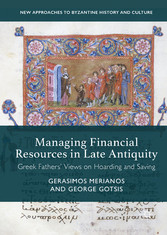Suche
Lesesoftware
Info / Kontakt
Managing Financial Resources in Late Antiquity - Greek Fathers' Views on Hoarding and Saving
von: Gerasimos Merianos, George Gotsis
Palgrave Macmillan, 2018
ISBN: 9781137564092 , 263 Seiten
Format: PDF, Online Lesen
Kopierschutz: Wasserzeichen




Preis: 69,54 EUR
eBook anfordern 
Mehr zum Inhalt

Managing Financial Resources in Late Antiquity - Greek Fathers' Views on Hoarding and Saving
Managing Financial Resources in Late Antiquity
4
Contents
6
Abbreviations
8
Chapter 1 Introduction and Acknowledgements
13
Chapter 2 Historical Background: Early Christian Conceptions of Hoarding
26
The New Testament World: Social and Economic Context
26
Intellectual Encounters: The Greek and Roman Literature on Household Management
28
Conceptualizing Hoarding
30
The Synoptic Gospels: Hoarding as Endemic to Human Acquisitiveness
30
The Excesses of Wealth Accumulation
32
Framing Early Christian Rhetoric on Hoarding
33
Hoarding Denounced: Wealth Employed to Perpetuate Injustice
33
Hoarding Mitigated Through Circulation of Surplus: Alleviating the Needy in Paul
34
Hoarding Abolished: The Ideal of Sharing Possessions
36
Hoarding as a Morally Perilous Practice
37
Hoarding as a Socially Detrimental Practice: Delivering Hoarders to Divine Judgment
38
Hoarding as the Corollary of Rapid Economic Growth: Endangering Faithfulness to Christ
39
Hoarding as a Form of Alienation from Fellow Believers: The Need for Benevolent Aid
40
Chapter 3 Justifying Savings but not the Pursuit of Wealth: Contradictions, Tensions and Accommodations in Early Patristic Texts
53
Economic Pursuits in the Graeco-Roman Urban Centres: The Social Setting
53
Glimpses of Hoarding and Saving in Graeco-Roman Literature of the Imperial Period
54
Justification and Distribution of Surplus
56
Work Ethic, Business Activities and Trade
56
The Justification of Moderate Prosperity
59
An Organicist View of Society
61
Welcoming the Rich
63
The Framework of Christian Discourse on Savings
66
Universalizing Moral Exhortations for Charity
66
Two Distinct Models of Almsgiving
68
Motives for Almsgiving
70
Chapter 4 Savings for Redistributive Purposes: Stewardship of Wealth in the Teachings of Basil of Caesarea and John Chrysostom
83
Sketching Out the Setting: New Responsibilities and Challenges
83
Aspects of Basil of Caesarea’s Views on Property and Wealth
87
Famine in Cappadocia, 368/9
87
Private Vs. Common Property, Hoarding Vs. Sharing
90
Institutionalizing Poverty Relief: Basil’s Pt?chotropheion and the Bequest of Gregory of Nazianzus
92
Delineating John Chrysostom’s Views on Hoarding
95
The Ideals of Self-sufficiency and Stewardship of Wealth
95
The Monastic Stewardship Paradigm
99
Hoarding as a Socially and Individually Inefficient Practice
101
A Call for Almsgiving
102
Usury in Basil of Caesarea and John Chrysostom
106
Chapter 5 Fifth-Century Patristic Conceptions of Savings and Capital: Isidore of Pelusium and Theodoret of Cyrrhus
126
Isidore of Pelusium
126
Pelusium
127
Isidore’s Attitude Toward Wealth: Benefaction vs. Accumulation and Luxury Consumption
128
Theodosius II Exhorted to Disperse Wealth
130
Mismanagement of Church Property: “Who Watches the Watchers?”
131
Eusebius, Bishop of Pelusium
133
Two of Eusebius’ Accomplices
135
Presbyter Zosimus
135
Martinianus the Oikonomos
136
An Assessment of Isidore’s Accusations of Ecclesiastical Mismanagement
138
Theodoret of Cyrrhus
141
Theodoret as a Civic Patron
141
Theodoret as a Mediator
144
Wealth, Poverty and Divine Providence
145
Economic Exchange Viewed as Social Cooperation
148
Theodoret’s Conception of Social Dynamics: An Appraisal
151
Chapter 6 Contextualizing Patristic Concepts of Hoarding and Saving
168
Economic, Monetary and Social Transformations
168
Debasements, Inflation and Reforms in an Age of Crisis
168
Shifting Gradually into the “Byzantine” World
171
The Constantinian Solidus: A Lever for Change
173
The Emperor as the “Lord of the Gold”
175
Imperial Reserves
176
The Formation of a “Golden” Elite
178
Melania the Younger: A Case Study of a Super-Rich Person’s Divestment
183
The First Steps of Divestment: Italy
183
The Role of Imperial Intervention in the Sale of the Couple’s Property
185
Melania’s “Poverty”
186
Coveted Patrons in Africa
187
The African Bishops’ Advice: A Turning Point in the Couple’s Benefaction
188
Transferring Monetary Capital in the Mediterranean
191
Chapter 7 Conclusions
205
Bibliography
214
Index
247




